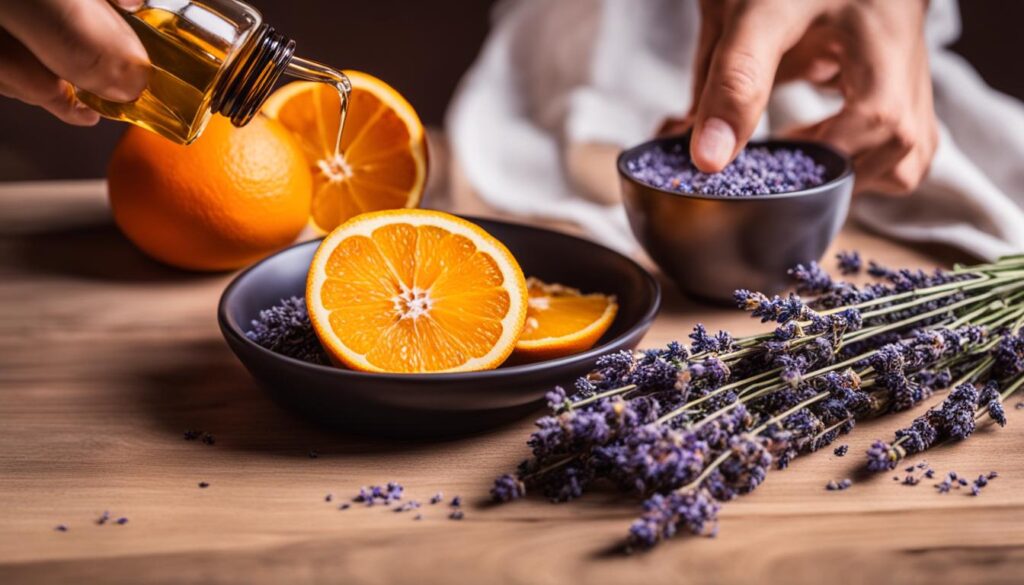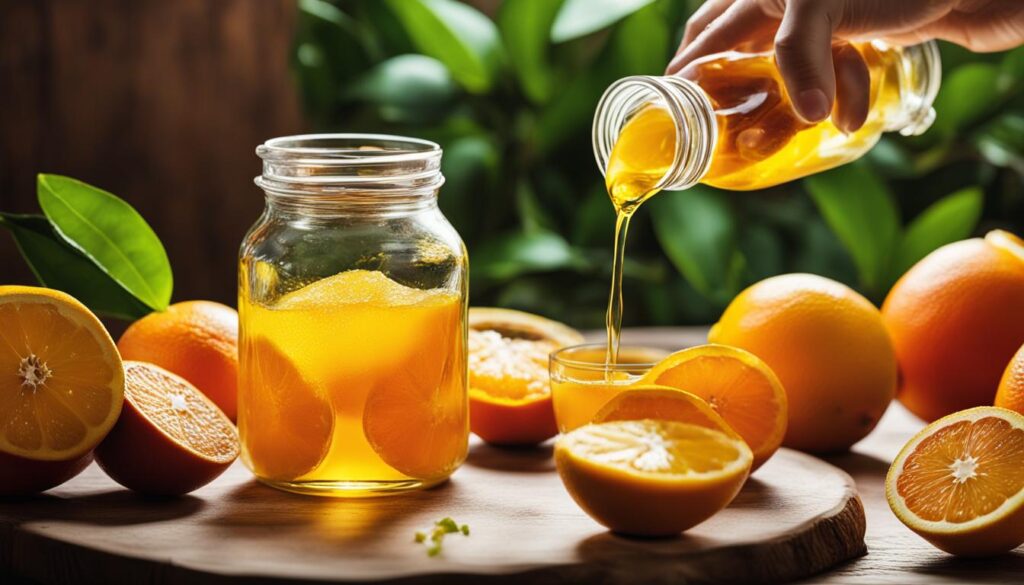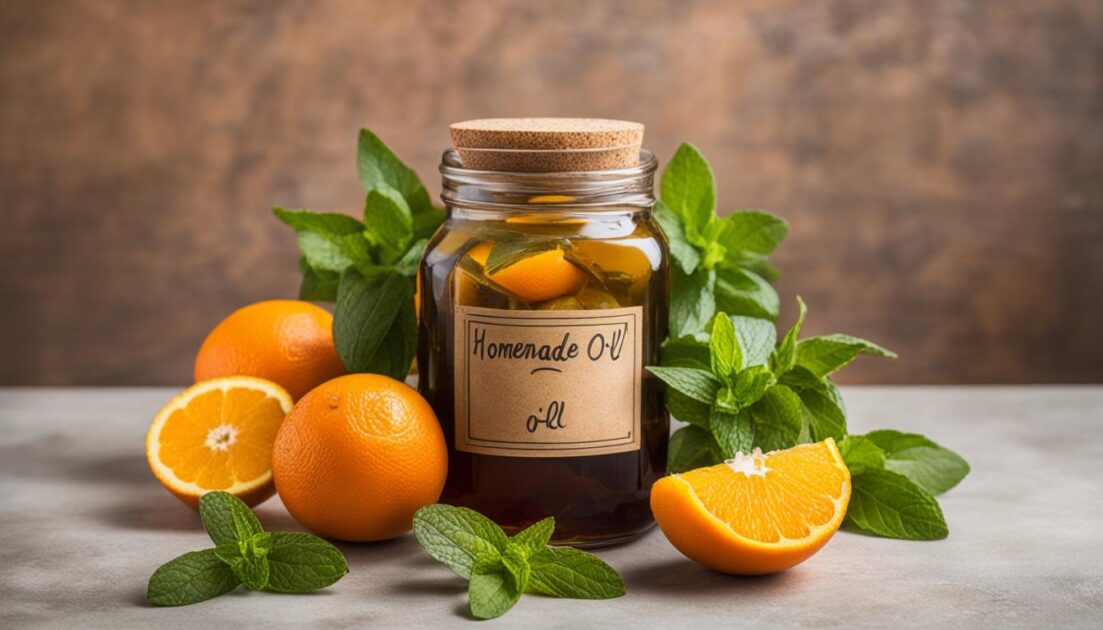Making your own orange oil at home is a simple and cost-effective way to enjoy its benefits and versatility. With just a few steps, you can create your own homemade orange oil using orange peels and alcohol. This natural and aromatic oil can be used in various applications, from cleaning to aromatherapy. Follow this quick and easy guide to learn how to make orange oil at home.
Key Takeaways:
- Making your own orange oil at home is a cost-effective way to enjoy its benefits and versatility.
- Orange oil is known for its uplifting and mood-boosting properties, making it popular for aromatherapy purposes.
- The step-by-step process of extracting orange oil involves drying orange peels, soaking them in alcohol, and straining the mixture.
- Other citrus fruits like lemons and limes can also be used to make homemade citrus oils.
- Once you have made your own orange oil, you can enjoy it in diffusers, as a natural cleaner, or diluted in carrier oils for massage or skincare purposes.
Benefits and Uses of Orange Oil
Orange essential oil is not only fragrant but also offers a wide range of benefits and uses. Its uplifting and mood-boosting properties make it a popular choice for aromatherapy, creating a refreshing and revitalizing atmosphere in any space. But the benefits of orange oil extend beyond its pleasant scent.
First and foremost, orange oil possesses antibacterial and antiseptic properties, making it a valuable ingredient in natural cleaning solutions. By adding a few drops of orange oil to your homemade cleaning products, you can effectively eliminate germs and bacteria while enjoying the fresh citrus aroma.
Additionally, orange oil is known for its diuretic properties, which can help support kidney function and promote detoxification. By stimulating urine production, orange oil aids in the elimination of toxins and waste products from the body, contributing to overall health and well-being.
Furthermore, orange oil has been used for centuries for its potential health benefits. It is believed to possess relaxant properties, which can help reduce anxiety, relieve stress, and promote a sense of calm. Orange oil can also be used to improve sleep quality, allowing for a more restful and rejuvenating night’s sleep.
The versatility of orange oil makes it a valuable addition to any natural wellness or DIY enthusiast’s collection. By making your own orange oil using the homemade orange oil recipe discussed earlier, you can harness these benefits and explore various applications.

Benefits of Orange Oil
| Benefit | Description |
|---|---|
| Aromatherapy | Uplifting and mood-boosting aroma |
| Antibacterial | Effective against germs and bacteria |
| Antiseptic | Promotes wound healing and prevents infection |
| Diuretic | Aids in detoxification and kidney health |
| Relaxant | Reduces anxiety and promotes relaxation |
| Sleep Aid | Improves sleep quality |
Step-by-Step Orange Oil Extraction Process
Extracting orange oil from orange peels is a straightforward process that can be done at home. Follow these simple steps to extract essential oil from oranges:
Step 1: Collect Orange Peels
Start by collecting orange peels after consuming the fruit. It’s best to use organic oranges to avoid any pesticide residues.
Step 2: Dry the Peels
Dry the orange peels by laying them on a sunny windowsill or using a dehydrator. Ensure they are completely dry before proceeding to the next step.
Step 3: Prepare the Extraction Mixture
Place the dry orange peels in a mason jar, filling it about halfway. Cover the peels with rubbing alcohol, ideally a high-proof one, to extract the oil effectively.
Step 4: Let it Soak
Seal the jar and let the mixture soak for about a week. This will allow the alcohol to extract the aromatic oils from the orange peels.
Step 5: Strain the Mixture
After a week, strain the mixture using a cheesecloth or a mesh sieve. This will separate the liquid, which contains the extracted orange oil, from the solid peels.
Step 6: Evaporation Process
Leave the liquid uncovered for another week. This will allow the alcohol and water to evaporate, leaving behind the concentrated orange oil.
Tips for Extracting Orange Oil
Here are some additional tips to ensure successful orange oil extraction:
- Use high-proof rubbing alcohol, such as vodka, for better oil extraction.
- Do not cut off the pith, as it contains the main component of the oil, limonene.
- Experiment with different citrus fruits, such as lemons and limes, using the same extraction process.
- Try using flavored vodkas, like vanilla vodka, to infuse additional aromas into the oil.
With these simple steps and tips, you can easily extract orange oil at home and enjoy its aromatic and therapeutic properties.
Other Citrus Variations and Tips
While orange oil is a popular choice, you can also explore other citrus variations by applying the same DIY method. Lemons and limes, for example, can be used to create unique homemade citrus oils. Follow the steps outlined in Section 3, using the respective fruit peels instead of orange peels. This opens up a world of possibilities, allowing you to experiment with different flavors and aromas.
For those seeking a fun twist, consider using flavored vodkas to steep the peels. Flavored vodkas like vanilla can add a delightful hint of fragrance to the oils, enhancing their overall scent and appeal. Remember, it’s crucial to use high-proof alcohol, such as vodka, to ensure optimal extraction of the oil.
When preparing the fruits for peeling, be mindful not to cut off the pith. The pith contains limonene, the primary component responsible for the oil’s aroma and therapeutic properties. By preserving the pith, you’ll ensure that your citrus oils are potent and fragrant.
Benefits of Citrus Variations
“Experimenting with different citrus fruits allows you to enjoy a diverse range of aromas and benefits. Each citrus fruit has its own unique fragrance profile and therapeutic properties, adding variety and versatility to your homemade oil collection.”
Whether you choose oranges, lemons, limes, or a combination of all three, making citrus oils at home is a gratifying endeavor that allows you to create your own signature blends. Let your imagination run wild and explore different combinations to craft delightful scents and maximize the potential benefits of your homemade citrus oils.

Comparison of Citrus Oils
| Citrus | Aroma | Therapeutic Benefits |
|---|---|---|
| Orange | Uplifting and energizing | Boosts mood, relieves anxiety, supports immune system |
| Lemon | Bright and citrusy | Enhances focus, purifies the air, aids digestion |
| Lime | Zesty and refreshing | Reduces stress, improves skin health, boosts metabolism |
Enjoying and Applying Homemade Orange Oil
Now that you’ve successfully made your own orange oil, it’s time to reap the benefits and explore its many uses. Orange oil offers a refreshing and uplifting aroma, making it perfect for enhancing your environment. Simply add a few drops to your diffuser or humidifier to enjoy its delightful scent throughout your home or workspace.
In addition to its aromatic properties, orange oil is also a powerful natural cleaner. Mix it with water or vinegar to create your very own homemade cleaning solution. This combination not only leaves your space sparkling clean but also adds a fresh citrus scent. Say goodbye to harsh chemicals and embrace the natural cleaning power of orange oil.
Furthermore, orange oil can be diluted in a carrier oil such as olive or coconut oil, opening up a whole new world of possibilities. Use this diluted mixture for massages, incorporating the soothing aroma and benefits of orange oil into your self-care routine. You can also apply it to your skin as a natural skincare solution. Its moisturizing properties make it an ideal addition to your daily beauty regimen.
With its versatility and countless benefits, homemade orange oil is a valuable asset in your day-to-day life. Incorporate it into your diffuser, cleaning routine, or personal care products to experience its uplifting effects and natural properties firsthand. Explore the wonders of orange oil and enjoy its wide range of applications.
FAQ
How do I make orange oil at home?
To make orange oil at home, start by collecting orange peels and drying them. Place the dried peels in a mason jar and cover them with rubbing alcohol. Let the mixture soak for a week before straining the liquid. Leave the strained liquid uncovered for another week to allow the alcohol and water to evaporate, leaving behind the concentrated orange oil.
What are the benefits and uses of orange oil?
Orange oil offers a range of benefits and uses. It is known for its uplifting and mood-boosting properties, making it popular in aromatherapy. It is also antibacterial, antiseptic, and diuretic, making it suitable for cleaning purposes. Additionally, orange oil has been used to reduce anxiety, promote sleep, and aid in detoxification.
Can I use other citrus fruits to make citrus oils?
Yes, the process of making orange oil can be applied to other citrus fruits such as lemons and limes. Simply follow the same steps using the respective fruit peels. You can also experiment with flavored vodkas, like vanilla, to steep the peels and create unique homemade citrus oils.
What type of alcohol should I use for making orange oil?
It is important to use high-proof alcohol, like vodka, to ensure the extraction of the oil. Rubbing alcohol is commonly used for this purpose.
How can I use homemade orange oil?
Homemade orange oil can be used in various ways. It can be added to a diffuser or humidifier for a refreshing aroma, used as a natural cleaner when combined with water or vinegar, or diluted in a carrier oil for massage or skincare purposes. The versatility of orange oil allows you to incorporate it into your daily routines and enjoy its numerous benefits.






